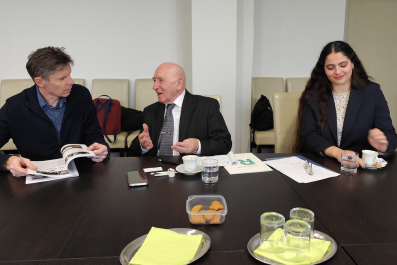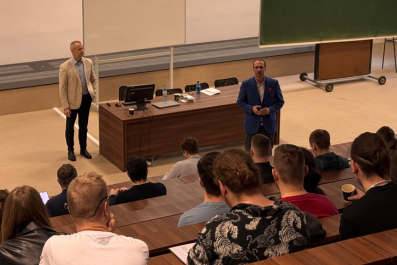STUDY PROGRAMME features and objective
Attained knowledge base
- A graduate expertly comprehends informatics and its disciplines (programming languages and integrated development environments, simulation systems, statistical tools) in conjunction with automation disciplines (technical and programmable machinery).
- A graduate is acquainted with systems theory, system modelling, and simulation.
- He or she comprehends process automation as well as theory of control systems.
- A graduate puts his or her obtained information of intelligent control methods together with methods and tools.
- A graduate is capable of data acquisition for analysis and synthesis.
- He or she knows the principles of information storage and distribution, including all the security aspects.
- Plots structures and components for complex control systems.
- Can develop and optimise continuous and discrete controllers for technological processes.
- Using the advantages of simulation tools, he or she can control and optimize systems and processes.
- He or she knows how to sophisticatedly prevent interference with the proper operation of control systems.
- Understands the principles of physical properties of materials and their quantification by means of measurement.
- Has a working knowledge of mathematics, physics, mechanics, electrotechnical engineering and their principles.
- They can outline each and every level of business management along with the strategies of vertical and horizontal data integration.
- Can delineate security threats and deviations and take corresponding action in terms of solutions.
- A graduate perceives the significance of Industry 4.0 and the core elements of its concept.
- He or she possesses the necessary scientific knowledge.
- A graduate understands and is up to speed with the latest details and figures about manufacturing technologies and information systems.
- He or she is competent within the necessary scope of academic English subsets chiefly intended for technology and science.
- A graduate exemplifies his or her understanding of business management and economics in practice.
Key learning outcomes
- Employing his or her accumulated intellectual resources, a graduate can design and program information and automation systems, exercising his or her erudition regarding algorithms and methods of software engineering.
- Proves his or her ability of independent theory, procedure and tool application when building systems of automated control used to command technological and manufacturing processes.
- Based on their educational attainment, he or she calculates the preconditions of solutions and subsequently designs, implements, and puts into working action information and communication technologies and systems of automated control of technological and manufacturing processes.
- A graduate brings software development tools into service when modelling manufacturing systems.
- He or she proves to be capable of sizing up techniques of fuzzy logic, machine and reinforcement learning, genetic algorithms and programming, evolutionary computation, and neural networks – inclusive of their quality of being appropriate of intelligent control.
- He or she recognizes software tools and consciously puts computing approaches of intelligent control into effect.
- He or she assesses any probable deviations pernicious to the handling of security-sensitive situations and takes apposite corrective measures.
- A graduate is, not only in theory, but also empirically, familiar with MATLAB and its components beyond the extent of fundamentals.
- Can process data and create documentations, overviews, and statistics proportionately to the technical norms and regulations as well as ethical and legal standards actual to the field of cybernetics for Process Automation and Informatization in Industry.
General competencies
- When solving assigned tasks, a graduate acts in a self-reliant manner.
- Applies analytical thinking patterns and adeptly presents his or her judgements and ideas.
- He or she possesses the ability to improve all qualifications gained up to a given point in time and educate oneself to a greater extent individually as well as in organised learning groups and courses.
- Competently collaborates in a group setting and, putting team management theories into practice, leads teams.
- Puts in an application his or her education as regards management, economics, law, ecology, and ethic while carrying out occupational duties.
- Presents himself or herself with a pioneering mindset and ideas.
- Showcases his or her linguistic relevance in relation to his or her line of employment.
labour market demand and CAREER PROSPECTs
- According to https://www.trendyprace.sk/sk/absolventi/moje-trendy/top, Process Automation and Informatization in Industry meets the market needs as the second most successful study programme (apart from other technology-based study programmes offered) in the Slovak Republic.
- A graduate is fit for immediate workforce inclusion in addition to being ready to move toward his or her doctoral studies. He or she makes use of information obtained during the course of the studies in scope of design, development, and implementation of automation control systems for industrial enterprises. Furthermore, he or she proves to be a vital part of projection modelling and research institutions for design of control and information systems intended for solving challenges of societal and industrial character. A graduate can pursue a career in the public administration and other economic sectors while also being suitable for engaging their abilities in the sphere of education.
- On the report of The Ministry of Labour, Social Affairs and Family of the Slovak Republic project, sk, graduates may seek following positions of employment: ICT project manager, computer operator, computer engineer, computer network technician, web designer, systems analyst, database administrator, database analyst, application developer, application programmer, data architect, data analyst, data scientist, machine learning engineer, CIO, ICT management and support technician, research and development manager, software developer, software solution designer, ICT support and test engineer, multimedia designer, business intelligence analyst, quality assurance analyst, process manager, PLC programmer, automation engineer.
Academic supervisor: prof. Ing. Pavol Tanuška, PhD. pavol.tanuska@stuba.sk
Educational consultant: prof. Ing. Pavel Važan, PhD. pavel.vazan@stuba.sk


